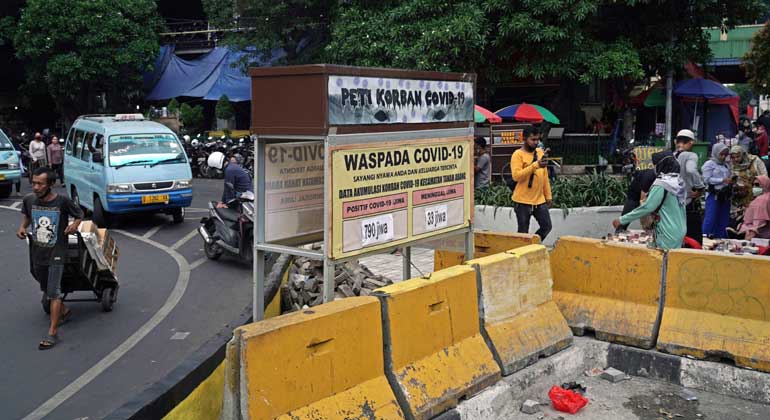
INDONESIA, the world’s fourth most-populous nation that’s battling Southeast Asia’s worst coronavirus outbreak, is gearing for a massive vaccination program that the government wants to start as soon as next month.
The government plans to kick off with an initial 3 million doses in December, prioritizing health workers, police, military and public servants, according to Budi Gunadi Sadikin, who leads the national economic recovery task force. The government expects another 13 million to be inoculated in the first quarter of 2021, with a majority of Indonesians receiving their jabs later in the year.
“I hope the vaccine will come by end of this month, we are trying,” said President Joko Widodo in a Wednesday briefing after supervising a vaccination simulation. “But if it can’t, it will come next month whether in raw material or as a finished good.”
Indonesia is banking on a vaccine as confirmed virus cases surpass 470,000 amid limited testing and contact tracing. The pandemic has driven the economy into its first recession since the Asian financial crisis and unemployment to a nine-year high.
The country needs about 246 million doses to vaccinate 107 million people ages 18 to 59 years old, Health Minister Terawan Agus Putranto said at the Tuesday meeting. The government will shoulder the cost of nearly 74 million doses. The roll-out would pose unique challenges for Indonesia, which would have to distribute vaccines across more than 17,000 islands.
Novavax, Inc. is set to provide 30 million doses of its vaccine candidate, augmenting Indonesia’s supply of 85 million from China’s Sinovac Biotech Ltd. and 57.6 million of the locally produced, Merah Putih Sadikin told parliament on Tuesday. Indonesia doesn’t have any supply deals with Moderna, Inc., Pfizer, Inc. and BioNTech SE which said their vaccines have above 90% efficacy rates.
While a successful COVID-19 vaccine would be a huge step forward for Indonesia, it would not be a “game-changer, at least in the sense that having a vaccine doesn’t stop the pandemic,” according to Panji Fortuna Hadisoemarto, epidemiologist and virologist at Padjadjaran University.
A vaccine will need to be distributed in stages due to limited availability, which means Indonesia will likely only reach sufficiently large coverage after a few months or even more than a year, Mr. Hadisoemarto said. The speed depends on the vaccine supply and distribution as well as the public’s willingness to get inoculated, he added.
Local clinical trials for the Sinovac vaccine are done and subjects have shown no serious adverse effects as of November 6, according to Penny Lukito, head of the country’s food and drug agency.
The first batch of Sinovac vaccines is slated to arrive at the end of this month. The regulator is ready to authorize it for emergency use once it completes data analysis from the clinical trials, or if U.S. and European regulators do the same, Ms. Lukito said.
The emergency use authorization should take about three weeks to process, Mr. Widodo said.
Indonesia also has rights to access as much as 10% of the total supply in the World Health Organization’s (WHO) pooled Covax clinical trials, which includes Moderna and AstraZeneca Plc’s vaccine candidates, according to Mr. Sadikin.
The government will use a digital platform that will allow it to monitor demographic data, logistics, distribution, procurement and implementation of the vaccination program, Mr. Sadikin said. It will also provide the public with a digital dashboard on the progress of inoculation. — Bloomberg
